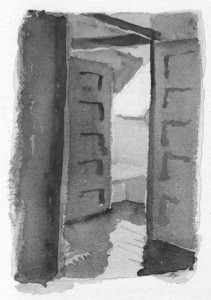 The open doors of her third floor studio inspired this black and white watercolor my mother painted to illustrate my grandmother’s poem about aging and seclusion. When the three of us started working on The View in Winter, Alice planned to use her skill as a colorist to brighten up her mother’s poems. I argued against the use of full color illustrations because I wanted the art to complement, not overpower, the verse. Alice agreed, reluctantly, to work in black and white, and later, she was glad. She said, “I could work at night, I could work anywhere, and I didn’t need to worry about things like being faithful to the color . . . After this, I came back to my color work with a new enthusiasm. It gave me a fresh look.”
The open doors of her third floor studio inspired this black and white watercolor my mother painted to illustrate my grandmother’s poem about aging and seclusion. When the three of us started working on The View in Winter, Alice planned to use her skill as a colorist to brighten up her mother’s poems. I argued against the use of full color illustrations because I wanted the art to complement, not overpower, the verse. Alice agreed, reluctantly, to work in black and white, and later, she was glad. She said, “I could work at night, I could work anywhere, and I didn’t need to worry about things like being faithful to the color . . . After this, I came back to my color work with a new enthusiasm. It gave me a fresh look.”
The 2nd profound shift to lighten and reframe the mother-daughter story is the shift from avoidance to openness.(click to tweet) For the three of us to work together with such focus and shared purpose was unheard of. My grandmother had cancer, and her long, remarkable life was coming to an end. She had asked her artist daughter for one simple painting to serve as the cover for a photocopied collection of her last poems. She planned to take it to a local printer near her retirement community.
Alice had other plans. She wanted to produce a first rate, illustrated book of her mother’s best poems. She asked me to serve as editor and publisher because my business, Wilson Creative, produced beautiful design and publications.
At first, I said no to the project because I was too busy and I knew it would dominate my schedule. But then I changed my mind and agreed. Alice originally said no to black and white, but then she changed her mind also. My grandmother, Margery, said, “Don’t go to too much trouble,” but then as we began work on the manuscript, she became a formidable wordsmith and detail person, in spite of macular degeneration and 92 years on the planet.
Working together on The View in Winter blessed all three of us. We could have easily missed out if we hadn’t opened up our hearts and said, “Yes, let’s do this!” For me, the shift happened when I read my grandmother’s manuscript and came close to tears over a poem she wrote about loss, “Thoughts on an Anniversary.” That response cued me to pay attention. Tears are markers for deferred dreams or buried wounds that the heart longs to address.
So for the second step of the MOM fix, give yourself permission to attend to these triggers and be curious. Why does a particular question, work of art, music or literature move you? Are you holding something deep inside that needs expression? My love of poetry and literature had been channeled into marketing, copywriting and design. While I was proud of the work I did for my clients, I understood that this three-generation project was an opportunity to follow my heart, put my talents toward the work of my dreams, and honor my mother and my grandmother. That was twenty-three years ago, and The View in Winter continues to sell and make new friends for my mother, and my grandmother, long after they have passed.
I hope you will open your heart and mind to consider what lurks there, waiting, to surprise, delight or change your story. Please let me know what this brings up for you, by posting a comment below. And if you’re longing to participate in the 12-week Mother-Daughter Way workshop, visit www.motherdaughterway.com. We start next week!
Blessings,
Amazing story — awesome the way you are illustrating your teachings with personal story experience in such a unique way. You and the women in your family are true leaders and yet ordinary people. Profound. Thank you.